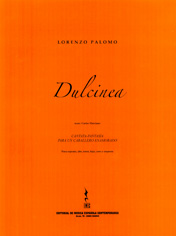Dulcinea
Cantata-Fantasy for a knight in love
For soprano, alto, tenor, bass, chorus and orchestra
On poems by
Carlos Murciano
COMMISSIONED BY THE
OPERA OF BERLIN, GERMANY
(DEUTSCHE OPER BERLIN)
-
- Los molinos de viento (The Windmills)
A whispering chorus conjures up the sound of the wind, and is joined by a simple oboe solo that transports us to the region of Castilla-La Mancha. The orchestra then enters with wild and electrifying rhythms which culminate in a dramatic choral outburst. The sails of the windmills begin spinning at full speed and the chorus rebukes Don Quixote, calling him a dreamer, a man bearing shield and lance, believing himself to be the finest horseman in La Mancha, but whose enemies are windmills and whose horse is tired and limping: a man defeated, leader of none. - La llamada del Caballero (The Knight’s Fanfare)
A bright fanfare announces the arrival of Don Quixote. - Canción del alba (Dawn Song)
The chorus greets the arrival of Don Quixote, as he rides out across the wide plains of La Mancha, dreaming longingly of his Dulcinea. - Canto de Don Quijote (Ballad of Don Quixote)
Don Quixote sings with passionate lyricism of his love for Dulcinea. He yearns for her to say his knightly name out loud, so that “all will become finer, and all will be more pure”. He tells of his travels across the plains of Montiel in search of his beloved – his hope and destiny – who, if she will speak his name just once, will make him the most favoured knight that ever lived. - Batalla de los molinos de viento (Battle of the Windmills)
The orchestra portrays Don Quixote’s attack on the windmills. - Seguidilla
To the lively rhythms of a Castilian seguidilla the chorus comments on Don Quixote’s desire for Dulcinea to speak his name and thus acknowledge the fact that his love for her has made her even more noble and beautiful. Whoever may come, be they enchanters or sorcerers, learned men or heroes such as Amadis and Florisel, her love must be his. The knight rides on across the plains, followed by the faithful Sancho. - Don Quijote y Sancho (Don Quixote and Sancho)
Don Quixote and Sancho have a slight disagreement. The knight tries to convince his squire that he should learn to love women the way he loves Dulcinea. Sancho, however, is very happy with his Teresa Panza and assures his master that she understands him very well and this is all he needs. Sancho now takes centre stage, singing with great passion and lyricism of his love for Teresa. - ¡Abracadabra!
The chorus casts a spell for Dulcinea to appear and speak the knight’s name. The music is rhythmic and lively but gradually quietens and becomes a lullaby that “rocks the moon above La Mancha”. The chorus asks the knight to keep his eyes closed and follow the path of his dreams. - Canto de Dulcinea (Ballad of Dulcinea)
The music begins by depicting Dulcinea and her companions playing and dancing in the fields. Dulcinea then appears in a vision as a princess filled with love and tenderness for Don Quixote. She tells us her name is “dulcet” and comes from deep within the mirror in which he saw her image, transformed into a lady fit for a noble knight. She goes on to say that her name is warm and tender because it comes from sun-drenched castles and the chambers of dreams. She is the princess of his desires, mistress of his thoughts. Dulcinea ends her ballad by bidding him welcome to her realm. - Canto final (Final Song)
Teresa Panza now appears to prove that both she and reality exist, a fact that Don Quixote and Sancho accept. The chorus sings a hymn to love and freedom, and the scene ends as Dulcinea repeats her words to Don Quixote: “May he be welcome in my realm”.
Lorenzo Palomo
English translation by Susannah Howe
- Los molinos de viento (The Windmills)
World Premiere
Konzerthaus, Berlin, Germany
May 15, 2006
Soprano: Ainhoa Arteta
Alto: Cheri Rose Katz
Tenor: Burkhard Ulrich
Bass: Arutjun Kotchinian
Chorus of the Berlin Opera (Deutsche Oper Berlin)
Berlin Opera Orchestra (Deutsche Oper Berlin)
Conductor: Miguel Angel Gómez Martínez
Publisher
Ediciones QUIROGA
Alcalá, 70
28009 Madrid, Spain
Tel: +34-91-577 07 51
editorialquiroga@edquiroga.es
www.edquiroga.es

